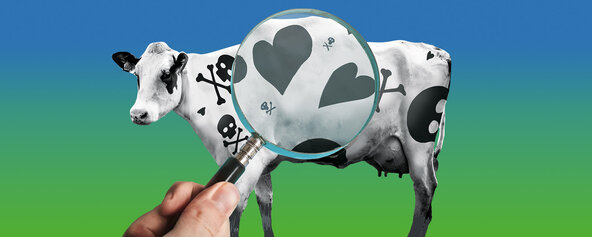
Does milk make us healthier? Does it make us fat? How does it affect our blood pressure? Let’s get one thing straight right away: It is not bad for our hearts, according to interim results from the Institute for Evidence in Medicine at the Freiburg University Medical Center, which carried out a network meta-analysis. With more than 1,400 people tested, scientists found milk and dairy products like cheese and yoghurt do not negatively influence blood pressure, cholesterol levels, or other risk factors for cardiovascular disease. It made no difference whether participants picked low-fat or full-fat products, nor whether they consumed more than the recommended two portions. Nutrition experts recommend 250 milliliters of milk or a dairy product, such as yoghurt, and two slices of cheese per day for adults.
Split on milk
The study is part of the “Update: Milk – News from Science” study, which is looking into people’s prejudices about milk. Launched a year ago, it also involves the Competence Centre for Nutrition in Freising and the Institute for Nutritional Medicine at the Technical University of Munich. “The topic of milk and milk consumption is becoming increasingly controversial, and objectivity is being lost,” says Hans Hauner, nutritional physician and head of the Munich research group. The scientists are pooling knowledge to create an overview of the latest findings. After all, there are plenty of observational studies about connections between milk consumption and disease risks out there, but scientists need more data. Update: Milk takes an empirical approach, finding evidence to supplement what other studies have observed.The study seeks to provide scientifically sound results in order to counteract some of the emotionally charged discussions found in social media, for example. “People listen more to those who shout the loudest rather than those who stay calm and objective,” says Hauner, who frequently sees statements that are not backed up by evidence.
Neutral to positive effects
Good news came out of the meta-network analysis presented last year. The researchers proved that low-fat and high-fat dairy products slightly improve systolic blood pressure, which measures the pressure of the heartbeat when the heart muscle contracts and pumps oxygen-rich blood into the blood vessels. Fermented products like yoghurt had even more positive effects. Moderate consumption of the products did not lead to an increase in body weight and barely affected blood lipid levels. These factors are markers for diseases such as circulatory disorders, heart attacks, strokes and diabetes. Cardiovascular diseases are the leading cause of death in Germany, accounting for around 40 % of all deaths. “We can see that milk and dairy products offer relatively good protection against colon cancer,” says Hauner. It is possible that the protective function is related to the calcium they contain, he adds. The scientists plan to study this area next. They are also investigating the effects of milk consumption on carcinomas and diabetes. “Milk is completely safe for most people and is a valuable food,” he says, noting it is also a good source of protein, vitamins and iodine.

